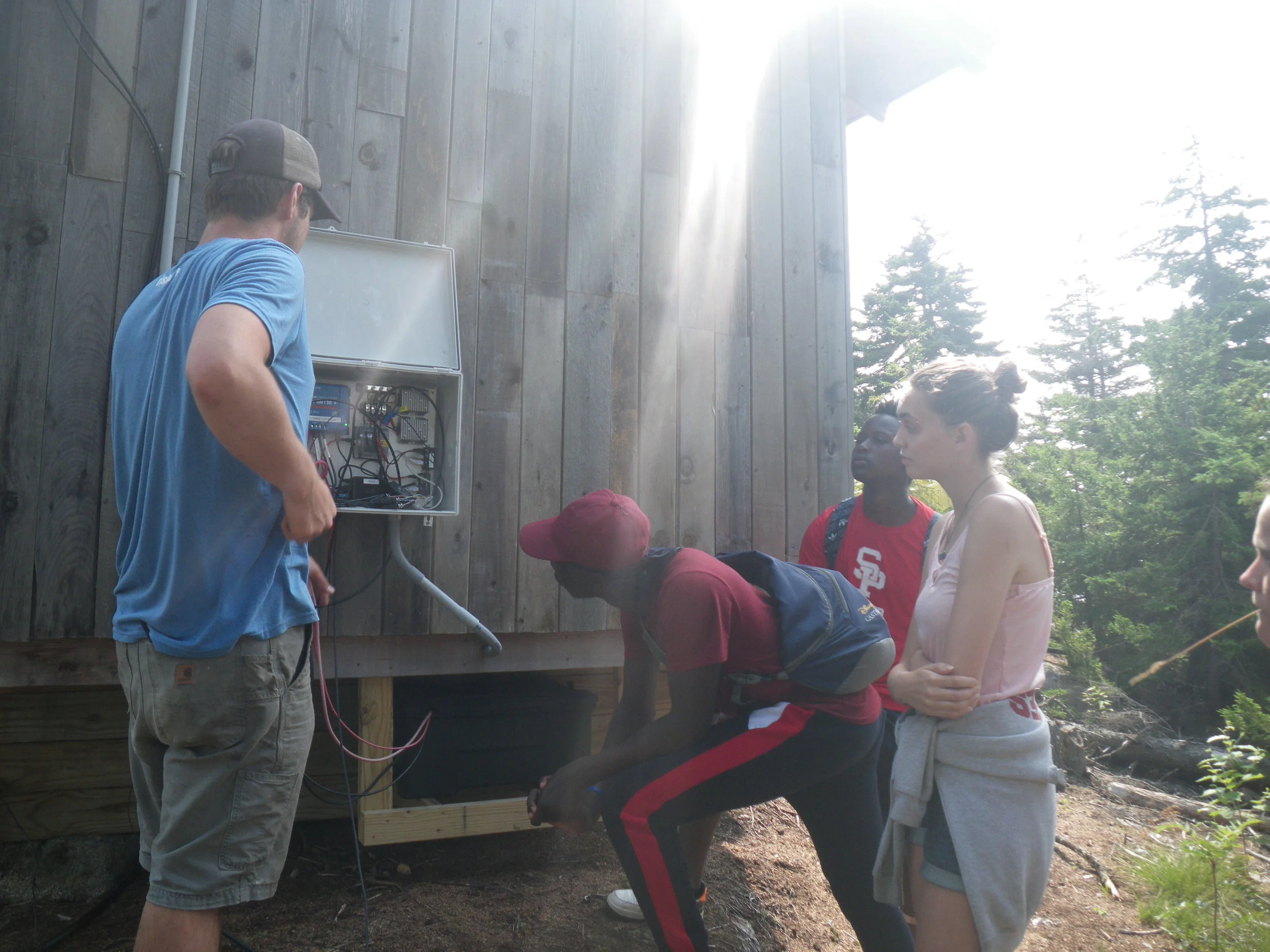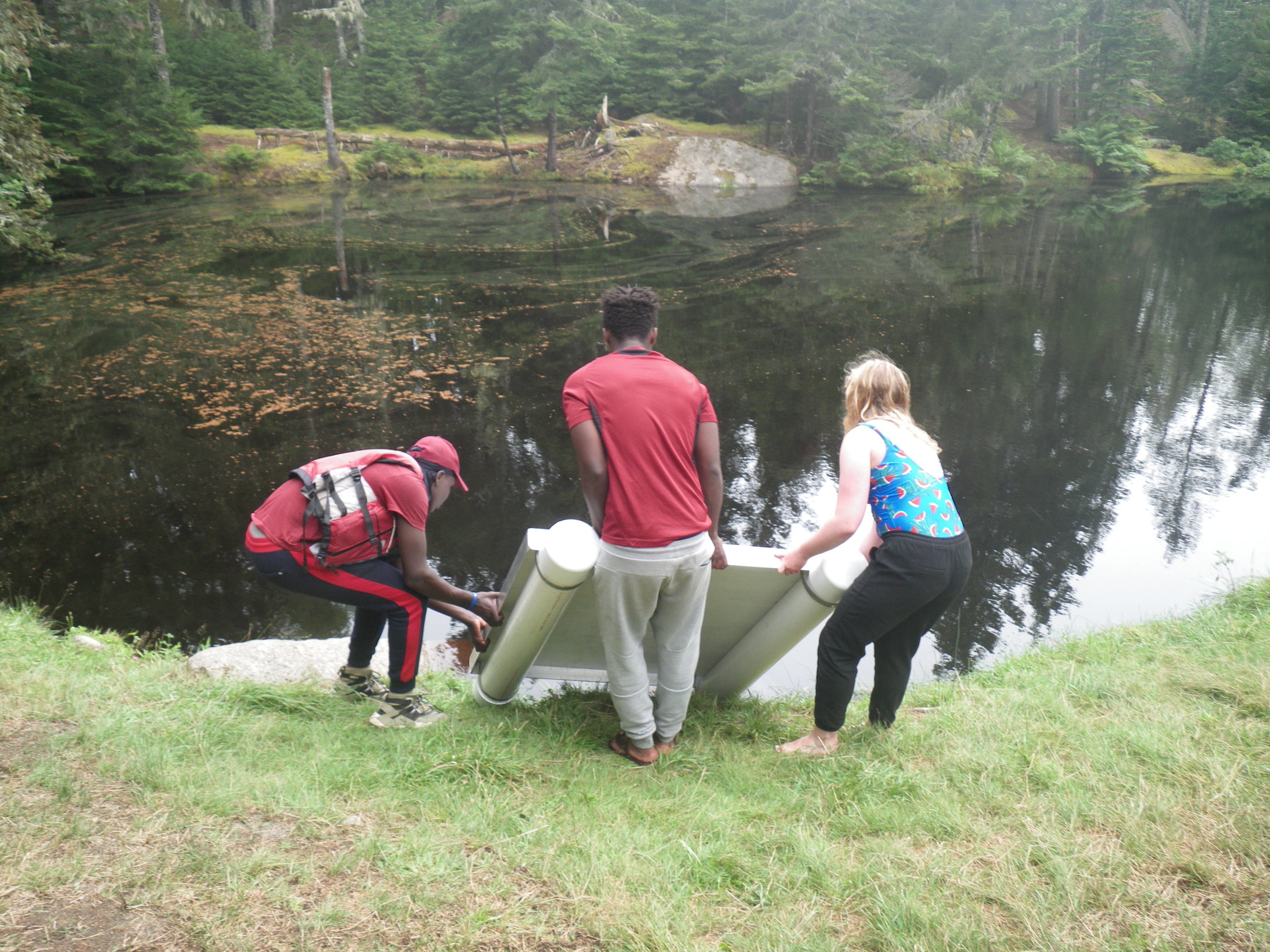Written by educator, Lilla Fortunoff
High School Sustainability Leadership (HSSL) was two weeks this year! Hurricane Island welcomed three students for this final hurrah of the summer season and it didn’t take long until we on Hurricane could feel and hear the joy and curiosity with which the HSSL students would enrich our community for the rest of the program. With a smaller student to educator ratio, the five of us in the program (aka the Fantastic Five) were able to take time to follow tangents that interested us and delve into connections that were critical for grasping the many theoretical and practical concepts we threw at our students.
After breakfast, our days always started by taking the kitchen waste from the prior 24 hours up the hill to the compost pile near our vegetable garden. While this may seem like a tedious chore, our students embraced it whole-heartedly. Through this process, they became intimately aware of the amount of food by-products (carrot tops, potato skins, etc.) and food waste (food that someone had not finished eating) that the community was producing. Every evening at dinner circle, the student who was our leader of the day would share the weight of the food waste the community had produced from the day before. It was awesome to have the students be the source of this information. They asked the community to make an effort to think carefully about the food you take to eat at every meal-would you actually be able to eat it all, or would it wind up in the buckets the HSSL students would carry up the hill? From this, Carolina and I were able to discuss strategies for communicating sustainable issues with our students - how do people react to being chastised? What happens when you can give folks constructive and practical tips for changing their behavior? We discussed how even though wasting food is a waste of money and the resources it took to grow and deliver that food, by being able to compost the food we can turn that organic matter into soil for our gardens! The idea that we actually want this soil to supplement our nutrient-poor, shallow soils on our granite island is one of many paradoxes that arise in the world of sustainable systems. For the students, this exercise was a way to test the waters and learn a lot along the way.
One of the things I love most about working for HICSL is getting to live on Hurricane Island itself. We have so many technologies and pieces of infrastructure (like our compost!) that help us use resources efficiently and reduce our reliance on fossil fuels while still living in a comfortable way with many conveniences. Carolina and I teamed up with many of our fellow HICSL staff members to provide our students with the most thorough picture of what it takes to make this scientific and educational community happen. With Garden Manager Marguerite Wiser and Garden Apprentice Alex Berry, we harvested vegetables and herbs from our garden, which we then brought to the kitchen and made a salsa, kale chips, and sun tea under the guidance of Cook, Sophia Palange, and Kitchen Assistants, Ella MacVeagh and Josiah Hansen. After lobster fishing and visiting our scallop and kelp aquaculture site with Captain Saphrona Stetson, we talked extensively with Aquaculture Manager, Jessie Batchelder about sustainable practices and limitations in the scallop aquaculture industry. We worked with Sustainability Engineer, Maeve Carlson, to calculate (and then live-action test) the buoyancy of a floating platform that will be deployed at our aquaculture site to collect temperature data from the ocean surface to sea floor. Maeve taught us about the small computer that she will attach to the platform to collect the data from the temperature probes and the solar panel system that will power it all. Facilities Manager, Silas Rogers, gave us a behind-the-scenes tour of our water system, from pump in the Quarry pond to our constructed wetland, which filters the grey water from our sinks and showers and returns it to the island’s water table. The students helped Silas to change the filters at the pump house and the storage tanks and we learned about how our solar evacuated tube hot water heater works to allow us to take fossil fuel-free hot showers on sunny days!
Another one of my favorite parts of the program was a recurring activity we called Article Club (we even came up with a theme song for it!). We dedicated five 1-hour blocks throughout the program to reading an article together as a fantastic five and then discussing it. We read about a wide range of sustainability-related topics including water access, climate refugees, and an airline that is telling people to fly less. Each student led one of the article club sessions by posing questions to the group to encourage reading closely and then facilitating a reflective discussion. We engaged in extremely thoughtful conversations that were enriched by the students’ willingness to openly share their perspectives and make connections to their personal experiences and prior knowledge.
From the program’s start to finish, Carolina and I were inspired by the passion and energy of our students. It was a though-provoking, heart-warming delight.







